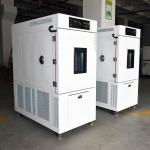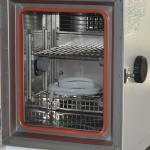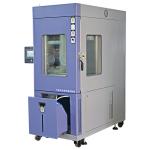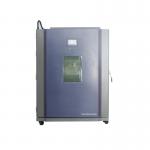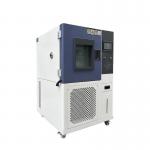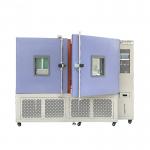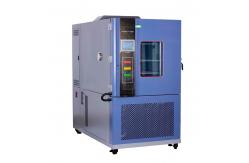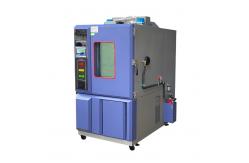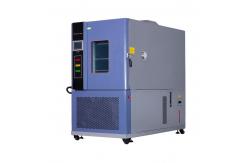In the demanding and complex world of industrial electronics, where
systems must endure harsh and variable environmental conditions,
the 225L Climate Chambers Temperature Humidity Test Chambers emerge
as a cornerstone of quality assurance and performance optimization.
These chambers are meticulously designed to subject industrial
electronics systems to a comprehensive range of temperature and
humidity extremes, ensuring their resilience and reliability in the
most challenging real-world scenarios. The 225L Climate Chambers Temperature Humidity Test Chambers are
purpose-built to evaluate the integrity and functionality of
industrial electronics systems. With a generous 225-liter capacity,
they offer ample space to accommodate a wide variety of
industrial-grade components, assemblies, and complete systems. In
industrial settings such as manufacturing plants, power generation
facilities, and transportation systems, electronics are exposed to
a gamut of environmental stressors. These chambers enable
manufacturers and engineers to simulate and analyze the effects of
temperature fluctuations from frigid cold to sweltering heat and
humidity levels ranging from bone-dry to highly saturated, thereby
identifying potential weaknesses and making informed design and
manufacturing decisions. - Robust and Insulated Chamber Structure
- The chamber is constructed with heavy-duty, corrosion-resistant
materials that can withstand the rigors of continuous and severe
testing. The walls are comprised of multiple layers of high-quality
insulation, providing exceptional thermal and moisture barriers.
This insulation not only ensures precise temperature and humidity
control but also minimizes energy consumption and external
environmental interference. The interior surface is smooth and
non-reactive, preventing any chemical or physical interaction with
the tested industrial electronics systems.
- The door of the chamber is engineered with a state-of-the-art
sealing mechanism, guaranteeing an airtight and watertight
enclosure. It is equipped with a heavy-duty hinge and a secure
locking system, allowing for easy access while maintaining the
integrity of the internal environment. The door also features a
large, impact-resistant viewing window, typically made of tempered
glass, which enables operators to monitor the testing process
without compromising the test conditions.
- Precision Temperature and Humidity Control Systems
- The temperature control system is a paragon of accuracy and
flexibility. It can maintain a vast temperature range, spanning
from -40°C to +120°C, with an astounding accuracy of ±0.2°C. The
system employs a combination of advanced heating and refrigeration
technologies, along with a highly sophisticated feedback loop and
an array of strategically placed temperature sensors. This ensures
uniform temperature distribution throughout the chamber and enables
rapid temperature changes, essential for simulating dynamic
industrial environments.
- The humidity control system is equally remarkable. It can adjust
the relative humidity from 5% to 95% RH, with a precision of ±1%
RH. The chamber is equipped with a high-efficiency humidifier and
dehumidifier, which work in harmony to achieve rapid and accurate
humidity adjustments. The system also incorporates a dew point
control function, crucial for testing applications where
condensation can have a significant impact on the performance and
reliability of industrial electronics systems.
- Advanced Instrumentation and Data Acquisition
- The chamber is outfitted with a comprehensive suite of
high-precision sensors. Temperature sensors are distributed
throughout the chamber to detect even the slightest temperature
gradients, ensuring a homogeneous thermal environment. Humidity
sensors provide real-time data on the relative humidity levels,
while additional sensors can be integrated to measure parameters
such as dew point, air pressure, and even particulate matter,
depending on the specific testing requirements. These sensors are
connected to a cutting-edge data acquisition system that records
and stores all measured data in real-time. The data can be accessed
and analyzed instantly or retrieved later for in-depth studies and
compliance reporting.
- The control panel of the chamber is user-friendly and intuitive. It
allows operators to effortlessly program and execute complex test
sequences, precisely setting temperature, humidity, and other
parameters, as well as customizing test durations and cycling
patterns. The panel displays all essential information, including
current temperature, humidity, and the status of the control
systems, and is equipped with built-in alarms and safety features
to alert operators in case of any abnormal conditions or system
malfunctions.
- Volume and Dimensions: The 225L capacity provides a spacious testing environment, with
interior dimensions carefully optimized to ensure efficient
utilization of space and uniform distribution of temperature and
humidity. The external dimensions are designed to fit within
standard industrial facilities without occupying excessive floor
space.
- Temperature Range: As mentioned, the chamber can operate from -40°C to +120°C. This
wide range is essential for testing industrial electronics systems
that may be exposed to extreme cold in refrigeration or outdoor
winter applications and extreme heat in industrial ovens, power
electronics enclosures, or desert-like environments.
- Humidity Range: The relative humidity can be adjusted from 5% to 95% RH. In
industrial settings such as chemical plants, food processing
facilities, or coastal areas, electronics may encounter a wide
range of humidity levels. Low humidity can cause static electricity
and dust accumulation, while high humidity can lead to corrosion,
short circuits, and other moisture-related issues.
- Uniformity and Stability: The temperature uniformity within the chamber is maintained
within ±0.5°C, ensuring that all parts of the tested industrial
electronics system experience a consistent thermal environment. The
humidity uniformity is within ±2% RH, providing reliable and
reproducible testing conditions. The stability of both temperature
and humidity is excellent, with minimal fluctuations over time,
allowing for accurate and long-term testing.
- Accurate Simulation of Industrial Environments
- The primary function of these chambers is to faithfully replicate
the complex and often hostile environmental conditions that
industrial electronics systems face. By precisely controlling
temperature and humidity, manufacturers and engineers can evaluate
how their systems will perform in real-world applications. For
example, testing a control system for a chemical processing plant
under high-temperature and high-humidity conditions can reveal
potential issues with component degradation, signal interference,
or software malfunctions, allowing for corrective actions to be
taken before deployment.
- The ability to conduct cyclic temperature and humidity tests is a
powerful feature. This involves subjecting industrial electronics
systems to repeated and alternating temperature and humidity
changes, which can uncover latent defects or weaknesses that might
not be apparent under static conditions. For instance, a printed
circuit board in an industrial automation system may develop cracks
or solder joint failures after several cycles of extreme
temperature and humidity variation. The testing chambers can detect
such issues early in the product development cycle, enabling
manufacturers to make design modifications or improve manufacturing
processes to enhance system reliability.
- Enhanced Industrial Electronics System Quality and Reliability
- Through rigorous testing in the chamber, industrial electronics
manufacturers can identify and address potential weaknesses in
their systems. For example, if a power electronics module shows
signs of instability under high humidity and temperature, the
company can explore alternative packaging materials, cooling
strategies, or component selections to improve its resistance. This
leads to the development of more stable and reliable industrial
electronics systems, reducing the risk of costly downtime,
equipment failures, and safety hazards in industrial operations.
- The test chambers also help in optimizing the installation and
maintenance schedules of industrial electronics systems. By
determining the ideal temperature and humidity operating ranges and
the effects of environmental stressors, manufacturers can provide
accurate guidelines for system installation, operation, and
preventive maintenance, ensuring maximum uptime and performance.
- Compliance with Industrial Electronics Standards and Regulations
- The industrial electronics industry is subject to strict standards
and regulations regarding product quality and environmental
testing. These 225L Climate Chambers Temperature Humidity Test
Chambers are a reliable tool for ensuring compliance. For example,
many industrial electronics systems need to meet specific
temperature and humidity performance requirements set by
organizations such as the International Electrotechnical Commission
(IEC) or industry-specific associations. By using these chambers to
conduct tests in accordance with these standards, manufacturers can
prove that their systems are fit for purpose and gain market
access.
- Regulatory bodies rely on accurate test results obtained from such
chambers to enforce safety and quality regulations. It serves as a
means for inspectors to determine whether industrial electronics
systems can withstand the environmental stresses they may encounter
during their intended use, thereby protecting workers, equipment,
and the environment.
- Stringent Manufacturing Process
- The 225L Climate Chambers Temperature Humidity Test Chambers for
Industrial Electronics System Testing are manufactured under strict
quality control procedures. Each component, from the advanced
insulation materials to th
|
